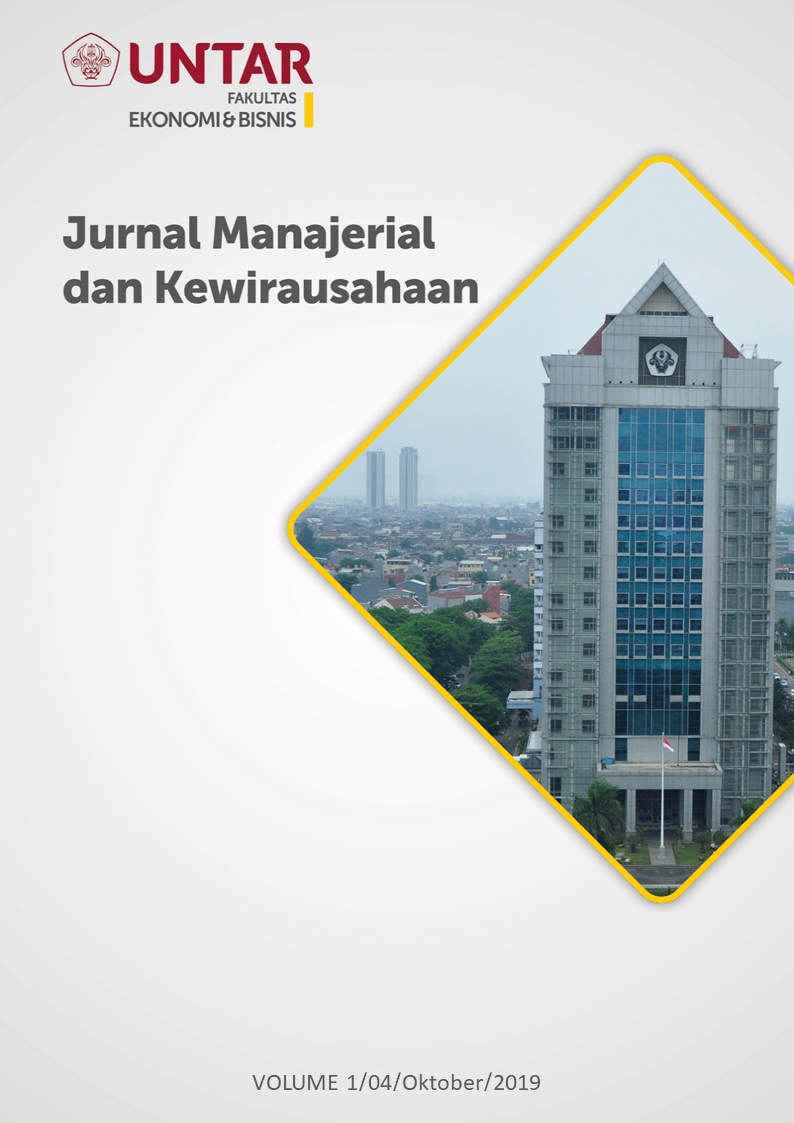Perilaku Kewirausahaan Terwaralaba: Studi Pada Waralaba Makanan & Minuman di Jakarta
Main Article Content
Abstract
The purpose of this research is to find out franchisee’s entrepreneurial behavior of food and baverage franchise in Jakarta . Sample was selected using nonprobabiliy sampling method amounted to 30 respondents franchisee in Indonesia. Data were measured by Likert scale and analyzed with processing techniques using IBM SPSS 20 program. The result of this study shows that, 1) intrinsic and extrinsic goals are positive predictors that not significant on franchisee’s entrepreneurial behavior, 2) desire for autonomy are positive predictors that not significant on franchisee’s entrepreneurial behavior, 3) relational satisfaction are positive predictors that not significant on franchisee’s entrepreneurial behavior, 4) economic satisfaction are positive predictors that not significant on franchisee’s entrepreneurial behavior, 5) local competition are positive predictors that not significant on franchisee’s entrepreneurial behavior, 6) urban store location are positive predictors that not significant on franchisee’s entrepreneurial behavior. Several recommendations for research are presented based on conclusions and suggestions on the results of this study.
Tujuan dari penelitian ini adalah untuk mengetahui perilaku kewirausahaan terwaralaba pada waralaba makanan dan minuman di Jakarta. Sampel dipilih menggunakan Teknik nonprobability sampling dengan jumlah 30 responden terwaralaba di Indonesia. Data diukur dengan skala Likert dan dianalisi dengan Teknik proses yang menggunakan program IBM SPSS 20. Secara keseluruhan, hasil penelitian ini menunjukkan bahwa, 1) tujuan intrinsik dan ekstrinsik merupakan prediktor positif yang tidak signifikan terhadap perilaku kewirausahaan terwaralaba, 2) keinginan untuk otonomi merupakan prediktor positif yang tidak signifikan terhadap perilaku kewirausahaan terwaralaba, 3) kepuasan relasi merupakan prediktor positif yang tidak signifikan terhadap perilaku kewirausahaan terwaralaba, 4) kepuasan ekonomi merupakan prediktor positif yang tidak signifikan terhadap perilaku kewirausahaan terwaralaba, 5) pesaing lokal merupakan prediktor positif yang tidak signifikan terhadap perilaku kewirausahaan terwaralaba, 6) lokasi unit perkotaan merupakan prediktor positif yang tidak signifikan terhadap perilaku kewirausahaan terwaralaba. Beberapa rekomendasi untuk penelitian disajikan berdasarkan kesimpulan dan saran mengenai hasil penelitian ini.
Article Details
Section
This work is licensed under a Jurnal Muara Ilmu Ekonomi dan Bisnis Creative Commons Attribution-ShareAlike 4.0 International License.,/p>
References
Birkinshaw, J., Hood, N., & Jonsson, S. (1998). Building firm specific advantages in
multinational corporations: the role subsidiary initiative. Strategic Management
Journal, 19(3), 221-241.
Carrier, C. (1996). Intrapreneurship in small business: an exploratory study.
Entrepreneurship: Theory and Practice, 21(1), 5-20.
Cristobal, E., Flavian, C. and Guinaliu, M. (2007). Perceived eservice quality:
Measurement validity and effects on consumer satisfaction and web site loyalty.
Managing Service Quality, 17(3), 317-340.
Croonen, E. P. M., Brand, M. J., & Huizingh, E. K. R. (2014). To be entrepreneurial, or not
to be entrepreneurial? Explaining differences in franchisee entrepreneurial behavior
within a franchise system. International Entrepreneur Management, 12(1), 531-553.
Dant, R. P., & Gundlach, G. T. (1998). The challenge of autonomy and dependence in
franchised channels of distribution. Journal of Business Venturing, 14(1), 35-67.
Davies, M. A. P., Lassar, W., Manolis, C. Prince, M., & Winsor, R. D. (2011). A model of
trust and compliance in franchise relationships. Journal of Business Venturing,
(3), 321-340.
Grunhagen, M., Wollan, M.L., Dada, O., & Watson, A. (2013). The moderating influence
of HR operational autonomy on the entrepreneurial orientation-performance link in
franchise systems. International Entrepreneurship and Management Journal.
doi:10.1007/s11365-013-0270-7.
Hornsby, J. S., Kuratko, D. F., & Zahra, S. A. (2002). Middle managers’ perception of the
internal environment for corporate entrepreneurship: assessing a measurement scale.
Journal of Business Venturing, 17(3), 253-273.
Ketchen, D. J., Short, J. C., & Combs, J. G. (2011). Is franchising entrepreneurship? Yes,
no, and maybe so. Entrepreneurship: Theory and Practice, 35(3), 583-593.
Kuratko, D. F., Hornsby, J. S., & Naffziger, D. W. (1997). An examination of owner’s
goals in sustaining entrepreneurship. Journal of Small Business Management, 35(1),
-33.
_______, ________, & Bishop, J. W. (2005). Managers’ corporate entrepreneurial actions
and job satisfaction. International Entrepreneurship and Management Journal, 1(3),
-291.
Noble, S. M., Griffith, D. A., & Adjei, M. T. (2006). Drivers of local merchant loyalty:
understanding the influence of gender and shopping motives. Journal of Retailing,
(3), 177-188.
Sekaran, U., & Bougie, R. (2016). Research Methods for Business, 7
th edition. Chicester:
John Wiley and Sons.
Timmons, J. A. (2004). New Venture Creation (6th ed.): entrepreneurship for the 21
century. New York: The McGraw Hill Companies.

